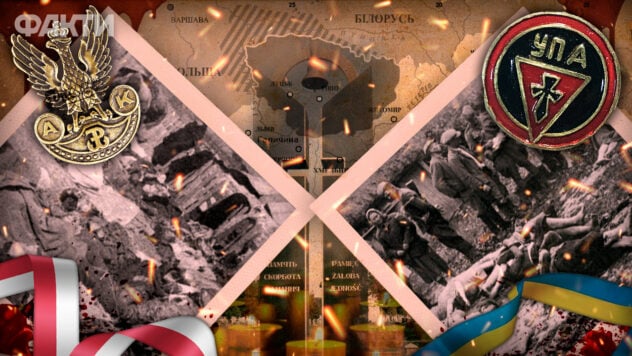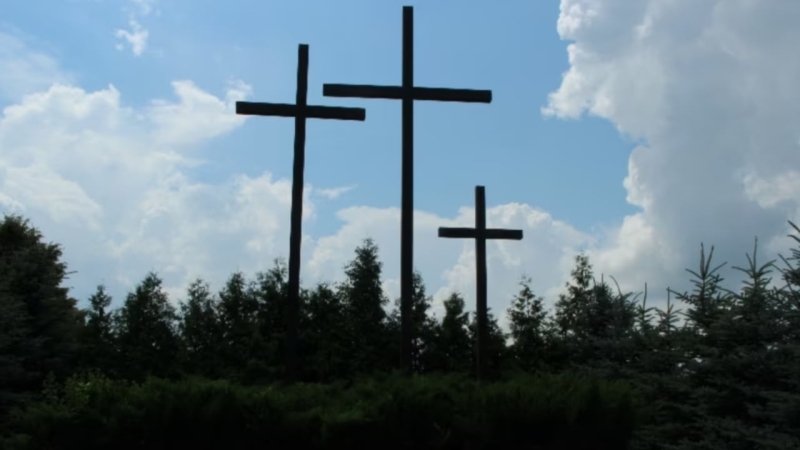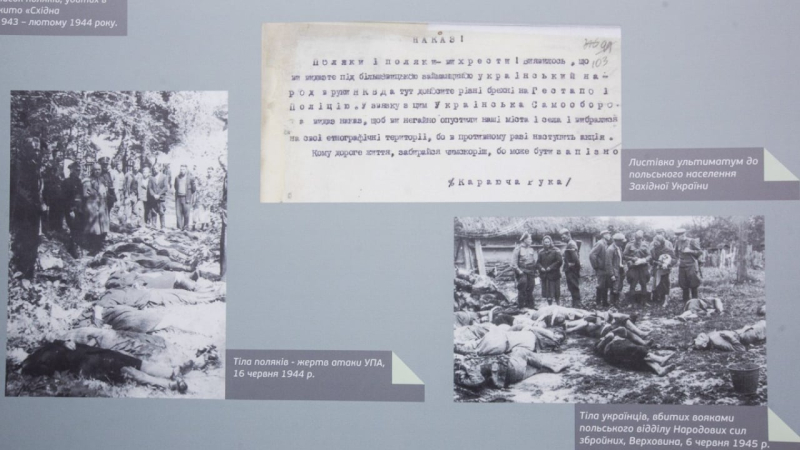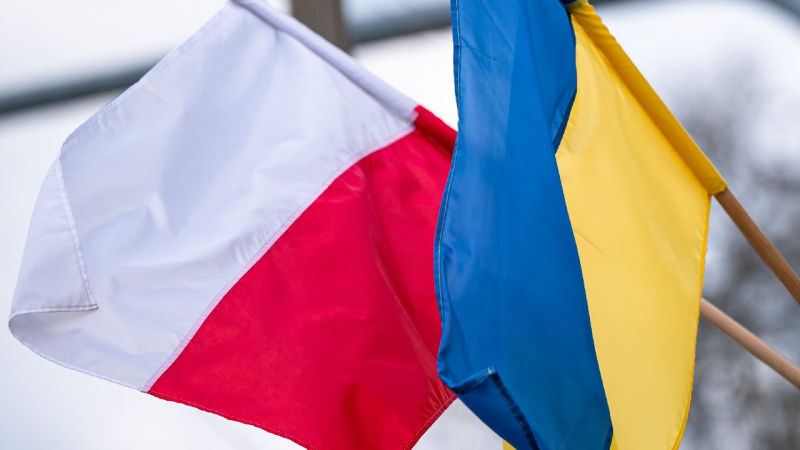
The terrible events in Volyn in 1943 in Ukraine are called the Volyn tragedy, while in Poland they are classified as the Volyn massacre. In July 2023, the 80th anniversary of this tragedy took place – the mutual ethnic cleansing of the Polish and Ukrainian populations, which was carried out by the Ukrainian Insurgent Army on the one hand, and on the other by the Home Army, with the participation of Schutzmannschaft battalions and Soviet partisans.
Regarding the victims of the Volyn tragedy, both sides give different figures: Ukrainian historians talk about 9-10 thousand Ukrainians killed, and some figures give up to about 15 thousand. Polish historians give a figure of 2-3 thousand Ukrainian victims of the Volyn tragedy.
According to Polish historians, about 35-40 thousand Poles died in Volyn in 1943-44. There is also a figure of 60 thousand, and in the Polish public space there are statements about 100 thousand dead Poles. Ukrainian historians call the figures inflated.
Currently watching
In July 2016, the Polish Sejm supported a document in which the events of 1943-1945 in Galicia and Volyn were called genocide of Polish citizens. July 11 was also designated as the annual Day of Remembrance for the victims of this tragedy in Poland.
And two years later, under the cabinet of Donald Tusk, the Sejm deputies adopted a moderate version of the Volyn resolution, in which the events in Volyn were called not genocide, but “ethnic cleansing with signs of genocide.” Mostly representatives of the Law and Justice party abstained from voting then, because they did not want to vote for a resolution that did not call the events in Volyn genocide.
Recently, Deputy Foreign Minister of Poland Pavel Jablonski said that Ukraine will be able to join the European Union only after the exhumation of the victims of the Volyn tragedy. According to him, this process has already begun at the first site in the village of Puzhniki in the Ternopil region.
Facts ICTV talked with Doctor of Historical Sciences Pavel Gai-Nizhnik on the issue of the Volyn tragedy, its causes, period and attitude towards it, and also asked political scientist Igor Reiterovich whether Poland could make this an obstacle for Ukraine on its way to the European Union.
What are the causes of the Volyn tragedy?
Historian Pavel Gai-Nizhnik notes that when talking about the Volyn tragedy, we must take into account why this could have happened at all. Why did Ukrainian “terrorism” and the Ukrainian national liberation movement arise?
Want to rest? Come to Facti.GAMES!
“Our partners, friends, neighbors sometimes forget that, according to the Treaty of Saint-Germain, they were supposed to provide the Ukrainian community with autonomy, in particular political and cultural, on the territory of Poland. This was ignored. Then a policy of reorganization and pacification was carried out. Plus religious terror through Catholicization, not by propaganda, but by force with the burning of churches. Accordingly, the ground arose for various Ukrainian youth organizations that did not want to tolerate this and resisted. This is how the OUN-revolutionary and many other organizations arose,” says the historian.
He notes that the Volyn tragedy is only a consequence of all these events. In addition, there is not a single order of the Ukrainian Insurgent Army, its leadership, its commander-in-chief about any repression or extermination of the Polish population.

Crosses at the site of the murder of 200 Poles on July 11, 1943 in the village. Pavlovka in Volyn. Photo: Galina Tereshchuk
On the same territory, on the one hand, the Germans acted in disguise, and on the other, the Soviet partisans, that is, the underground detachments of the NKVD. All this provoked a chain reaction of mutual revenge.
“At the same time, the UPA command has nothing to do with this. Another thing is that there were individual incidents where historians know the names and culprits. Therefore, the Volyn tragedy is not a massacre of Ukrainians against Poles, as our Polish neighbors show. This is a conflict provoked by the German authorities and the Russian-Soviet underground in order to pit two peoples against one another under the pretext of previous contradictions,” points out Gai-Nizhnik.
The historian adds that there are known facts that the Polish police, servants of the Gestapo, served by ethnic Poles, had weapons and the right to shoot Ukrainians. Accordingly, there was an action of retaliation.
“Then these acts of retaliation acquired great calculation and volume, but the UPA never spoke about the extermination of the Polish population. These are all Soviet narratives, and those who spread information about this in Poland, and in particular in Ukraine, are, firstly, lying, and secondly, working for Russia in order to break the Western civilizational front and to discredit Ukrainians and Poles in the eyes of each other.
He adds: Real scientists have proven that all this was an interpretation and false things, because of which certain conflicts arose, when disguised Soviet underground fighters came and exterminated a Polish village in the form of the UPA, accordingly, the Home Army carried out a retaliatory action, and so certain conflicts arose.
There were several options for negotiations between the Ukrainian and Polish national liberation undergrounds in 1943, 1942 and earlier. The historian says that this means that those who really fought knew then who was provoking these inter-ethnic clashes.
— It must be said that, in the end, Volyn is an ethnohistorical Ukrainian land that was occupied by Poland, and the other part by Soviet troops and the authorities of the USSR. Ukrainians waged a historically justified, in particular from the point of view of modern international law, national liberation struggle,” he notes.
Why is the ethnic cleansing of Ukrainians, in particular by the Home Army, rarely remembered in Poland?
– The Polish establishment, especially the political one, “trades in deaths” – this is the most base way of popularity among voters and the plebs. There were ethnic cleansings, also created by the Home Army, and not only by them, but also by the Polish Schutzmanns, ethnic Poles who were given weapons by the Germans. These are former landowners as well as criminal elements who often posed as the Home Army, but the Home Army also committed crimes.
The historian notes that the Polish political establishment is speculating, calling all Ukrainians rezuns, personifying this in the Ukrainian Insurgent Army, and transforming these relapses of the past into the present. This is irresponsible and means that those who do this are working for Russian Kremlin propaganda.
When a certain detachment, where there is a surname, including Polish, maybe Ukrainian, committed some kind of crime, it is necessary to name the detachment and those responsible.
What period does the Volyn tragedy cover?
— The greatest surge in the four-way confrontation on the territory of Volyn – Polish, Ukrainian, Soviet and German, where the Soviets and the Germans played behind the scenes and provoked it, occurred in 1943. This is the greatest apogee of this, where excellent manipulators speculated well not only on the distant past, but also on the recent one,” says Gai-Nizhnik.
There are still no final numbers of victims either from the Ukrainian or from the Polish side, but there is a lot of political speculation on this side. Therefore, in the socio-political context, it is important to give this topic to academic historians, he believes.

Exhibition 100 Years of Neighborhood: Ukraine and Poland, dedicated to Ukrainian-Polish relations over the last 100 years, in Kyiv in November 2018. Photo: UNIAN
Large neighboring nations have always had difficult relations and tensions. We know about the hundred-year wars, the wars of German Prussia and France, the Anglo-French confrontation. But this does not prevent these countries from being allies today.
How should Ukrainians feel about the Volyn tragedy?
– Like the tragedy of the Ukrainian people, who were subjected to repression and extermination by the Polish occupiers, since this is a Ukrainian historical and ethnic territory that was occupied. These repressions and destruction were caused and fueled by the Soviet underground and the German occupation authorities.
We know only one thing: all the victims on the Ukrainian side of the Volyn tragedy are Ukrainian citizens without de jure citizenship, but are ethnic Ukrainians. Some of them took part in the national liberation struggle, while others were supporters of Ukrainian statehood, and were also brothers, sisters and children of our people.
Therefore, they all need veneration, our candles and memory, and most importantly, we will never give up our honor and dignity to the political conjuncture of the present. This is our land, our people, and the innocently killed need to be revered, and the heroes who defended these innocently killed should receive our worship and glory, notes Gai-Nizhnik.
Can Poland make the topic of the Volyn tragedy an obstacle for Ukraine on its way to the EU?
Political scientist Igor Reiterovich does not believe that this topic will be raised as a key topic in Poland, but “they will certainly talk about it, since it is important, at least for the current ruling coalition.”
— There is an interesting nuance here, which is related to the fact that much will depend on what kind of coalition will be formed in Poland. If the one that is now oppositional, left-liberal, is finally formed there, then they will not raise the issue of historical memory as harshly as it is raised, for example, by Law and Justice (PiS).
Then they will talk about it, but perhaps they will still make the right move, so that it would be right both on their part and on our part to leave this issue to historians. So that historians, not politicians, do this. Moreover, we have the Institute of National Remembrance, and they have the Institute of National Remembrance. It would be necessary to communicate at this level,” he believes.

Photo: Deposithotos
Reiterovich notes that if representatives of right-wing conservative parties retain certain positions, they will certainly bring up the issue of the Volyn tragedy, constantly remember it and demand that Ukraine take certain steps that are acceptable to them.
– In this case, for example, exhumation of bodies. On the other hand, this is not a serious topic for Ukraine. I mean that we have no fundamental reluctance to do this. Ukraine is ready to work in this direction, the only thing we said and raised this issue in previous years is that this should be a mutual process. We do research here, you do research here. Because there are also UPA soldiers who died and were buried on the territory of what is now Poland.
Therefore, in the context of some kind of joint commission, these issues can be resolved, but I don’t think that it will be so key that Poland will manipulate it and put a spoke in Ukraine’s wheels on its way to the EU. After all, they have more pressing issues related to the same agricultural sector. It is more important than a question of history.
— That is, this issue can be mitigated in the potentially new government of Donald Tusk?
– Certainly. Even when they went to the elections, the left-liberal coalition did not raise these issues as strongly and harshly as PiS did with its partners. For them, the issue of historical politics is part of a triad that they constantly talk about: historical politics and memory, Catholicism and right-wing traditional, conservative values. They have this very strongly connected. They talked a lot about history.
You can remember that under the previous president Petro Poroshenko there were agreements. It was as if everything had been agreed upon, and in some moments, for the sake of fairness, the Poles violated these agreements.
They did not do any things regarding the Ukrainian burials that were on the territory of Poland, and therefore, if the government changes now, Tusk and his coalition will have much more important issues that they will deal with: both at the level of the European Union and at the level relations with Ukraine.
— The issue of historical memory will be there, but it will not be the key one. It definitely won’t be included in the top three (important issues – Ed. ), and maybe even in the top five, because they are actually interested in other things. They can take such a step and say: let historians come to a common agreement, draw up some kind of map of burials, a map of exhumations that need to be done, and we will then decide, for example, at the government level.
— What is the risk that after Hungary with the language issue, Poland with the Volyn tragedy, other neighbors of Ukraine will put forward similar demands?
— In principle, if you look at it this way, we don’t have any other super-principled humanitarian issues with other countries. At the same level as we had with the Poles and Hungarians, this never happened to us. Other minorities that exist in Ukraine, their countries have not raised such issues.
Therefore, I think that with other countries we will have a more economic discussion. And these two countries can potentially add to it such humanitarian, national, and linguistic factors. They will use it quite actively, of course,” the political scientist concluded.

